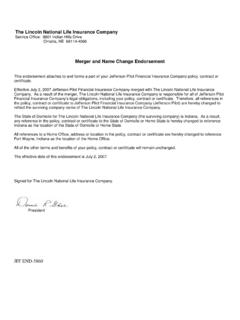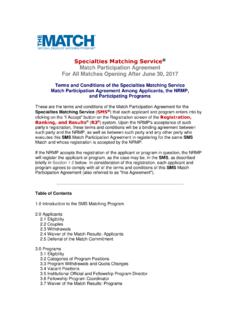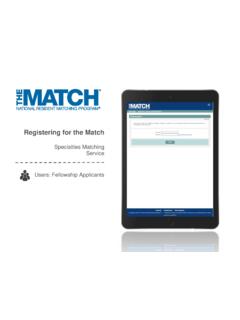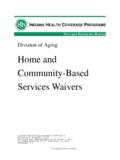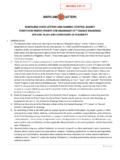Transcription of TAB 5 FAMILY PARTNERSHIP AGREEMENT - …
1 TAB 5. FAMILY PARTNERSHIP AGREEMENT . Adult Education.. 9-10. Assessment Through FAMILY Visits.. 11-12. Awareness of Personal Attitudes.. 4-8. Developing Partnerships.. 3. FAMILY PARTNERSHIP AGREEMENT Procedure.. 18-21. FAMILY Development Matrix.. 39. FAMILY Development Scale and Explanation*.. 22-23. FAMILY Development Assessment and Explanation*.. 24-31. FAMILY Development Plan, Explanation, and Examples of Goals*.. 32-37. FAMILY Contact Log Form and .. 54-55. FAMILY Service Advocate Meetings Report Form, Explanation & Contact .. 69-74. FSW Outcomes For FAMILY Goals Forms and .. 41-53. Home Visit/ FAMILY PARTNERSHIP AGREEMENT Worksheet Form and Explanation.
2 63-64. Issues in FAMILY Visits.. 13-17. Monthly Referral Report Form, Referral Codes, and Explanation.. 56-60. NENCAP FAMILY Services Department - Guidelines for Emergency Assistance.. 75- NENCAP Referral Form and .. 61-62. Partnering With Parents.. 2. PIR Explanation.. 65-68. Goals.. 40. Safe Environment Checklist*.. 38. *indicates that this form is available in Spanish 1. Partnering With Parents All parents and caregivers share a deep concern and love for their children. Their desire to do the best they can for their families provides a foundation for working with them to explore strategies for caring effectively for their children.
3 Approaching parents as the experts on their own children, listening openly to their concerns and perspectives, and seeking solutions with them (rather than providing for them) help foster a trusting relationship. When we work with parents in a spirit of true PARTNERSHIP , mothers, fathers, and other caregivers are more likely to invite and welcome provider's support in evaluating needs, developing goals, and identifying effective ways to strengthen the FAMILY and provide care for children. Benefits of PARTNERSHIP Partnering with parents and caregivers: Focuses attention on the overall well-being of the child and FAMILY , rather than on specific symptoms in isolation.
4 Results in more competent and relevant supports, as providers gain a greater understanding of FAMILY 's perspectives, homes, and environments. Fosters parent leadership skills, resulting in more confident parenting and enhanced ability of mothers, fathers, and other caregivers to advocate for their families' needs. Promotes lasting change, as parents build on existing skills and enhance natural support networks that will extend beyond the time frame of a provider's involvement. The Meaning of PARTNERSHIP Working in PARTNERSHIP with parents and caregivers means: Understanding that all parents have strengths, and helping families build on their strengths and recognize their personal power to ensure FAMILY success.
5 Viewing parents as the experts on their own children, supporting them with resources, and sharing responsibility for outcomes. Listening carefully to parents' concerns and helping them identify solutions that will work for their FAMILY . Including parents in the development, implementation, and evaluation of processes and programs that are driven by parent's needs and incorporate their ideas and suggestions. Helping parents take responsibility and learn to advocate more effectively for themselves and their children. Working to understand parent's language and culture, and adjusting communication to reflect differences.
6 2. DEVELOPING PARTNERSHIPS. As a FSW, you are a facilitator of learning. You help parents grow in parenting skills, problem solving, coping skills, knowledge of child development, and advocacy skills for their child and themselves. To really help, you must develop a PARTNERSHIP with the families with whom you work. Beginning to build partnerships is always difficult. The following foundations are necessary in order to form this type of relationship and build partnerships: Awareness of FAMILY systems Awareness of personal attitudes Development of mutual understanding Effective communication skills Awareness of FAMILY Systems Families have changed dramatically in recent years.
7 There are more single parent families and more births to unmarried mothers. Over half of all female headed households with children under six live below the poverty line. Nationally, one in ten adults have a problem controlling the alcohol he or she consumes. Families have changed in a large part due to increased stress, unemployment, lack of medical coverage, mobility, and lack of extended FAMILY and friends for support. With fewer resources, a FSW needs skills to assess FAMILY priorities and match FAMILY priorities to child needs. The most common FAMILY today consists of a mother and one or more children.
8 Some families are larger, embracing extended FAMILY members. Another type of FAMILY can include mother, friend, and children. In other cases, children participate in the lives of two families or two parents. Families come in different forms with a variety of needs. A successful FSW respects a FAMILY 's value system without passing judgement. To build trusting relationships, FSW's must understand FAMILY dynamics and structures. FAMILY structure refers to the FAMILY 's size, the culture, and belief system. A FAMILY 's structure determines how that FAMILY meets their needs and fulfills their functions (economic, physical, socialization, recreational, etc).
9 In addition, each FAMILY 's needs and functions change as they pass through FAMILY stages (adulthood, birth of children, departure of children). It's easy to see that families are complicated systems. Any time we try to change one part of the system (children's skills, mothers function), the rest of the FAMILY will also be effected. 3. AWARENESS OF PERSONAL ATTITUDES. To develop effective relationships with families you must be aware of your personal values and attitudes. Attitudes are rooted in your up bringing, education, and life experiences. Most attitudes help build partnerships with families; however, some attitudes interfere.
10 Consider your opinions about the following statements. Parents are not accurate observers/reporters of their child's behavior. Parents are unrealistic goal setters. Parents do not know what their child needs. Parents do not know how to teach. Parents need us. These statements reflect only a few judgements many hold about parents. Ignoring such attitudes may inhibit you. Acknowledging your opinions and feelings will assist you in not allowing them to interfere with building FAMILY partnerships. Building an effective PARTNERSHIP with a FAMILY requires a FSW to accept the following: Families want to do what is best for their children.
